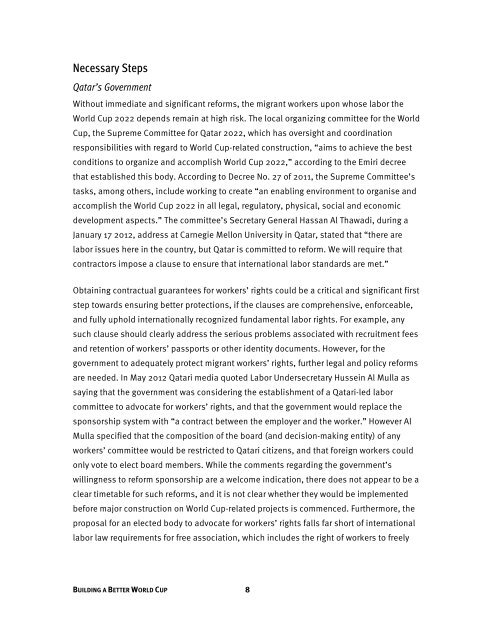Download the full report - Human Rights Watch
Download the full report - Human Rights Watch
Download the full report - Human Rights Watch
Create successful ePaper yourself
Turn your PDF publications into a flip-book with our unique Google optimized e-Paper software.
Necessary Steps<br />
Qatar’s Government<br />
Without immediate and significant reforms, <strong>the</strong> migrant workers upon whose labor <strong>the</strong><br />
World Cup 2022 depends remain at high risk. The local organizing committee for <strong>the</strong> World<br />
Cup, <strong>the</strong> Supreme Committee for Qatar 2022, which has oversight and coordination<br />
responsibilities with regard to World Cup-related construction, “aims to achieve <strong>the</strong> best<br />
conditions to organize and accomplish World Cup 2022,” according to <strong>the</strong> Emiri decree<br />
that established this body. According to Decree No. 27 of 2011, <strong>the</strong> Supreme Committee’s<br />
tasks, among o<strong>the</strong>rs, include working to create “an enabling environment to organise and<br />
accomplish <strong>the</strong> World Cup 2022 in all legal, regulatory, physical, social and economic<br />
development aspects.” The committee’s Secretary General Hassan Al Thawadi, during a<br />
January 17 2012, address at Carnegie Mellon University in Qatar, stated that “<strong>the</strong>re are<br />
labor issues here in <strong>the</strong> country, but Qatar is committed to reform. We will require that<br />
contractors impose a clause to ensure that international labor standards are met.”<br />
Obtaining contractual guarantees for workers’ rights could be a critical and significant first<br />
step towards ensuring better protections, if <strong>the</strong> clauses are comprehensive, enforceable,<br />
and <strong>full</strong>y uphold internationally recognized fundamental labor rights. For example, any<br />
such clause should clearly address <strong>the</strong> serious problems associated with recruitment fees<br />
and retention of workers’ passports or o<strong>the</strong>r identity documents. However, for <strong>the</strong><br />
government to adequately protect migrant workers’ rights, fur<strong>the</strong>r legal and policy reforms<br />
are needed. In May 2012 Qatari media quoted Labor Undersecretary Hussein Al Mulla as<br />
saying that <strong>the</strong> government was considering <strong>the</strong> establishment of a Qatari-led labor<br />
committee to advocate for workers’ rights, and that <strong>the</strong> government would replace <strong>the</strong><br />
sponsorship system with “a contract between <strong>the</strong> employer and <strong>the</strong> worker.” However Al<br />
Mulla specified that <strong>the</strong> composition of <strong>the</strong> board (and decision-making entity) of any<br />
workers’ committee would be restricted to Qatari citizens, and that foreign workers could<br />
only vote to elect board members. While <strong>the</strong> comments regarding <strong>the</strong> government’s<br />
willingness to reform sponsorship are a welcome indication, <strong>the</strong>re does not appear to be a<br />
clear timetable for such reforms, and it is not clear whe<strong>the</strong>r <strong>the</strong>y would be implemented<br />
before major construction on World Cup-related projects is commenced. Fur<strong>the</strong>rmore, <strong>the</strong><br />
proposal for an elected body to advocate for workers’ rights falls far short of international<br />
labor law requirements for free association, which includes <strong>the</strong> right of workers to freely<br />
BUILDING A BETTER WORLD CUP 8

















